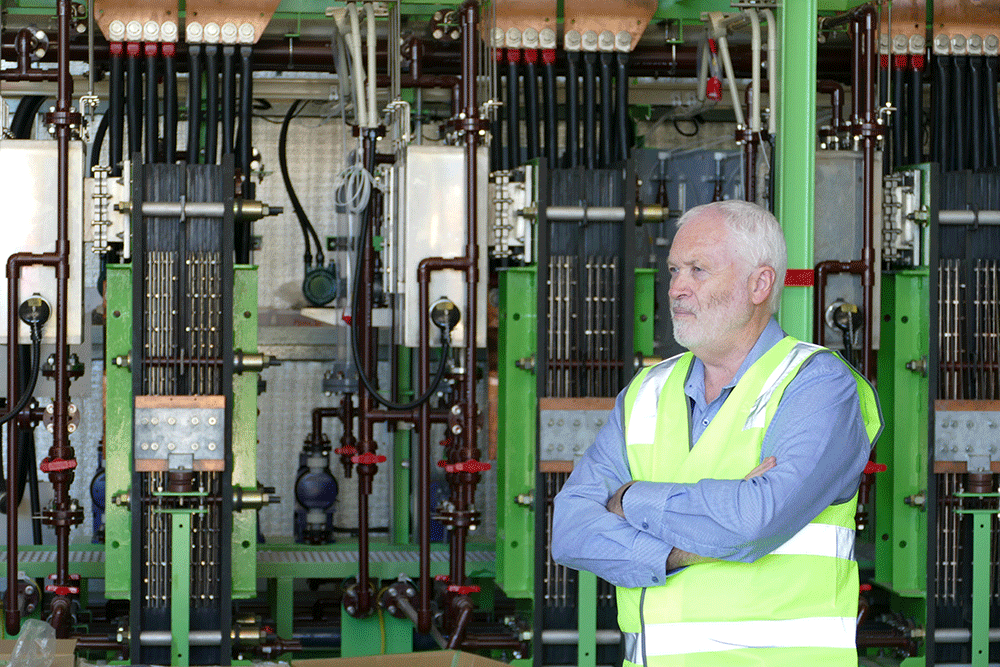You’d think Mount Isa gets enough light with its sunny days and starry nights, but there are a few good reasons we want to shine the spotlight on this vibrant outback city.
Mount Isa is part of the North West Queensland Water and Sewerage Alliance QWRAP group with its Chair, Stephen Jewell, based in Mount Isa. The alliance includes 8 Local Councils including Burke, Carpentaria, Cloncurry, Doomadgee, McKinlay, Kowanyama, Mount Isa and Richmond.
Established in 2019, the alliance has completed several collaborative projects that have provided significant benefits to the region. QWRAP bidpool funding allowed the region to establish key governance documents including the Constitution and Memorandum of Understanding, and to conduct a strategic workshop to identify an agreed vision, mission and objectives for the alliance.
The first collaborative project was to complete an audit and analysis of SCADA systems of four participating councils, improving management of schemes including safety and security of supply. The project exposed Councils to new technology and standards and allowed them to create a regional framework for procurement for future SCADA systems. This opened the door for other procurement projects including for lagoon desludging, reservoir cleaning and water mains air scouring.

Being a resource-rich region, it will come as no surprise that it can be hard to attract, train and retain staff with the fierce competition from the mining sector. A skills needs analysis has been completed and the alliance is now focused on identifying the training needs for each existing plant type in the region. By aggregating the training needs for the region, the alliance will be better placed to attract an RTO to deliver the training, saving the region money while building stronger networks across the region.
Mount Isa Water Board Laboratory Services
One of the key messages we heard from talking to CEOs and Operators during the 2024 Water Connections Tour was the issues around water testing. If you’ve cursed Australia Post or any other delivery service for slack delivery of your online purchases, spare a thought for the operators who need to send water samples at a certain temperature and within a certain timeframe to a very limited number of accredited laboratories. Not to mention the cost involved in the transport, on top of the actual testing.
Mount Isa Water Board hopes to be able to provide some relief for the western regions as they expand their lab testing services.
Compliance and Quality Lead – Operations Division at MIWB, Renju Joseph and her small team have been undertaking critical water quality analyses at their dedicated microbiology and chemistry laboratories for over a decade to ensure the city’s drinking water meets the highest standards.
Tests for E.coli, total coliforms and Faecal coliforms are completed by TECTA systems which is a rapid automated microbial detection technology. In addition to a range of physical chemistry tests including organic carbon, MIWB also completes ELISA (Enzyme Linked Immuno-sorbent assay) for blue-green algae toxins using specialised kits.
Now, the team is investigating obtaining NATA accreditation, and if it would provide benefits to MIWB and the wider north west area.
“We see potential benefits of being NATA accredited to validate and give us confidence in our own work, but getting accreditation may help our neighbouring Councils as well,” Renju said.
“Over the past two to three years we have been helping Boulia Shire Council and Tobermorey Station, NT with their microbiology testing and we’ve assisted MICC with testing in the past.”
Renju and her colleague Zoe Tebbutt (Compliance and Quality Coordinator) grabbed the opportunity to visit Mackay Regional Council’s lab recently, which was helpful as they consider the NATA criteria to identify gaps in their quality management systems.
“We may need to add some more procedures to get ready, but ultimately we will end up with a strong Quality Management system and a manual to go with it, even if NATA accreditation does not eventuate,” she added.
The lab is also set up to do weekly tests for cyanobacteria toxins, in particular cylindrospermopsin which is a common blue-green algae that often rears its head at the Clear Water Lagoon. The good news is that this type of toxin can be neutralised by chlorine.
In a recent qldwater webinar series on Harmful Algal Blooms, Senior Water Treatment Lead at MIWB, Tania Strixner-Harvey, shared their journey in managing this challenge over the past ten years.
In the webinar, Tania described the many steps that they have taken to manage HAB in their water supply system , due to local climatic conditions, can occur at any time of the year.
The principal tool has been the installation of microfiltration units, which have performed well, treating source water that has had up to 6.8 million cells per millilitre of water! Incremental continual improvements since then have included measures such as aeration to prevent stratification of the water bodies and removing overhanging vegetation to minimise roosting opportunities for local wildlife. MIWB has also trialled chemical and ultrasonic methods for algal control and continues to monitor and improve its performance.
Mount Isa Water Board’s business roadmap focusses on developing strategic partnerships, continuously improve water quality and reliability, reducing the energy costs involved in transportation of water, reducing environmental impact, optimising asset management, digital transformation, and improved data analytics.
Mount Isa Electro Chlorination Project
Another topic that affects most of our members is the risk around critical supply chains to ensure that the parts and the chemicals required at treatment plants can be transported and stored safely. This was highlighted during and post the COVID-19 pandemic when qldwater members raised the problem of access to essential water treatment chemicals like Sodium Hypochlorite. Supply is currently dominated by large companies based interstate or in major capital cities, which poses a risk for remote and regional areas in Queensland.
In response to these supply chain concerns, qldwater, in collaboration with Government officials, has been actively exploring local solutions. A significant initiative is the development of an Electro Chlorination system which is co-located at the Mount Isa Wastewater Treatment Plant. This project aims to provide fresh Sodium Hypochlorite across the local region, thereby mitigating the dependency on interstate suppliers and enhancing supply security for the Queensland Water Sector.
Luke Sirl, Business Manager at DGL Water, showed participants on the Water Connections Tour through the site which can produce Sodium Hypochlorite at concentrations up to 12.5%.
Luke explained that although the technology is extremely scalable and configurable to each site and region, the Mount Isa plant specifically has a total capacity of approximately 180kl p/month. The co-located Electro Chlorination process is both safe and economical, making it ideal for the Australian water industry, and building it at the STP has expedited approval processes.
“This system replaces the need for transporting and storing extremely hazardous chlorine gas, thereby minimising associated risks and costs. Typically, in direct injection scenarios, the electrolyser ensures a consistent supply of disinfectant, improving the reliability of water disinfection processes and ensuring regulatory compliance. Its compact design and advanced technology also offer energy savings and lower maintenance requirements, contributing to overall cost-effectiveness and sustainability in water treatment operations.”
“With more than 50% of this plants capacity available for offtake, the mineral-rich northwestern region of Queensland will now have a safe and affordable reliable source of fresh chlorine.” Luke said.
The plant will supply fresh Sodium Hypochlorite within a radius of approximately 500km, significantly improving the availability of this critical chemical in regional areas.
The Mount Isa Electro Chlorination plant is in the final stages of construction, with commissioning planned for June. The qldwater team is closely monitoring the progress of this trial. Based on the outcomes, there is potential to replicate this model in other QWRAP regions, thereby expanding the local production capacity and further securing the supply chain for the water sector.
We would like to thank MICC Director Infrastructure Services, Stephen Jewell for his support, not only during the recent Water Connections Tour but as a long-term supporter of the urban water sector. Stephen has been an active participant on the qldwater Strategic Priorities Group for many years and has been a guiding star for the North West QWRAP region since its establishment.
Our Success Stories
 Building sustainable service models in remote regional communitiesAugust 6, 2024 - 10:05 am
Building sustainable service models in remote regional communitiesAugust 6, 2024 - 10:05 am South West QWRAP Collaboration Attracts Graduate EngineerJuly 20, 2024 - 9:09 am
South West QWRAP Collaboration Attracts Graduate EngineerJuly 20, 2024 - 9:09 am Spotlight on Mount IsaJune 30, 2024 - 9:00 am
Spotlight on Mount IsaJune 30, 2024 - 9:00 am
Research
 Improving Nitrogen Detection TechnologyFebruary 18, 2022 - 9:00 am
Improving Nitrogen Detection TechnologyFebruary 18, 2022 - 9:00 am Northern Queensland Research on ContaminantsMarch 12, 2021 - 9:00 am
Northern Queensland Research on ContaminantsMarch 12, 2021 - 9:00 am Smoothing out the Infrastructure CliffNovember 22, 2020 - 9:09 am
Smoothing out the Infrastructure CliffNovember 22, 2020 - 9:09 am
Resources
 HR/IR ToolkitApril 19, 2024 - 9:00 am
HR/IR ToolkitApril 19, 2024 - 9:00 am





